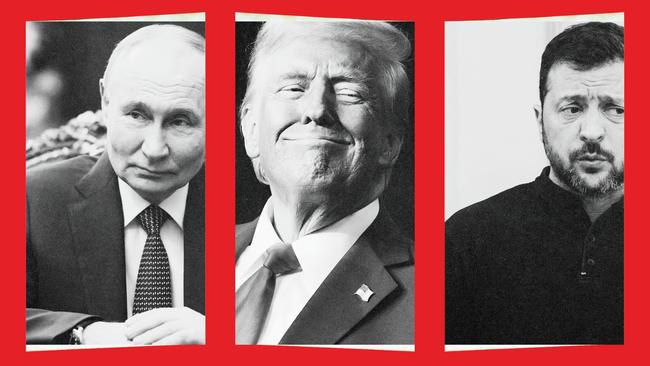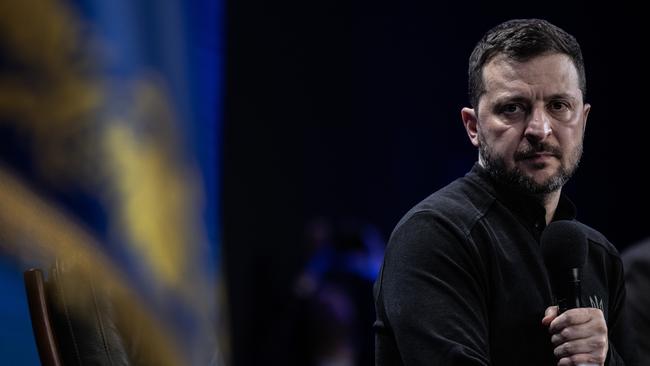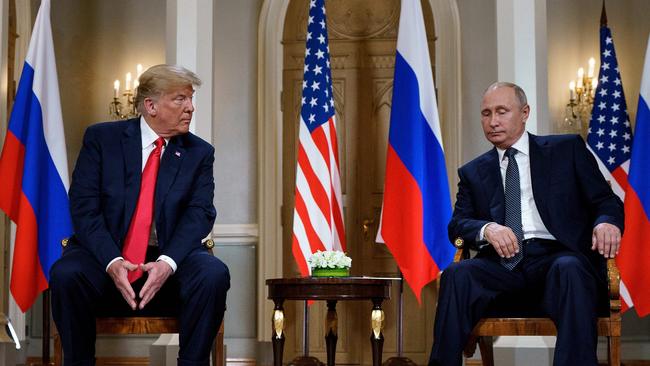
He hasn’t ended the Ukraine war in 24 hours but his commitment to end the war is beyond dispute and in the process Trump has launched the greatest strategic revolution in Europe for more than 70 years.
If Trump’s plan were merely to shock Europe into accepting its national responsibilities, increasing its defence budgets and accepting more of its security needs vis-a-vis the US, then such goals would make sense and be fully justified, within and outside Europe.
But Trump’s statements mock any claims this is the limit of his ambitions. His signals are unmistakeable – Trump likes Vladimir Putin as a fellow strongman and transactional rival while he loathes Ukraine’s Volodymyr Zelensky, an elected democratic leader who stayed in Kyiv rather than abandon his country and heroically has led its defence.
Trump blames Zelensky and Ukraine for the war. Last week Trump said: “You should never have started it. You could have made a deal.” He branded Zelensky “a dictator without elections”. He warned Zelensky needed to move fast “or he is not going to have a country left”. He wants Ukraine to hold elections but says Zelensky won’t because his ratings are down to 4 per cent.

Trump accused Zelensky of talking the US into “spending $350bn to go into a war that couldn’t be won”. Incredibly, he blamed Zelensky for involving the US in the conflict.
These claims are not just untrue and the numbers false. That’s being polite. They are lies and big lies. Most are straight Kremlin propaganda. But some of Trump’s claims are so fantastic not even the Kremlin has thought them up.
Trump’s purpose is obvious – to discredit Zelensky, to deny his legitimacy, to weaken Ukraine, to drive Zelensky to acquiesce before a deal negotiated by Trump and Putin.
The facts tell a different story – Putin annexed Crimea in 2014 and launched a full-scale invasion in February 2022, his goal being the subjugation of Ukraine, the elimination of its national sovereignty and the quest to restore imperial Russian greatness.
Russian Foreign Minister Sergey Lavrov, commenting on who advised Putin on war, reportedly said: “Ivan the Terrible. Peter the Great. And Catherine the Great.”
Trump brands Zelensky the dictator when Putin is the dictator of 25 years. Trump brands Ukraine the villain when it is the victim. By exaggerating the war dead – Trump claims millions have died – his purpose is not to condemn Putin but to ruin Zelensky. But Trump’s hostility towards Zelensky transcends the personal – his attitude towards Ukraine is the deep insight into Trump’s transforming world views as US President.
Trump has no sense of a democracy under attack – something US democratic allies might reflect upon. What future instance of a democracy under attack won’t he accept? Trump won’t even accept the truth of the war – an act of aggression by Russia – because his mind is geared to great power legitimacy and sphere of influence entitlement.
Indeed, there is little evidence Trump believes in collective security, the essence of the US alliance system since World War II.
Trump’s core message, recently conveyed by Defence Secretary Pete Hegseth, is that the US has no role as a security guarantor for Ukraine in any peace settlement and this would become the responsibility of European and non-European forces in a “non-NATO mission”.
Trump’s view, also conveyed by Hegseth, is that the US is shifting its global priorities away from Europe and NATO to the American continental homeland and the Indo-Pacific region.
Herein lies the ultimate meaning of the MAGA movement – reducing US global responsibility by prioritising its hi-tech, domestic tax cutting, economic reindustrialisation and cultural revisionism.

This US retreat is the conclusion being drawn by European leaders. But whether they possess the unity and the political willpower to revive their nations and implement the vast increases in defence and security resources now demanded of them is another question entirely.
Putin would welcome all these signals. His first goal is to take Ukraine via a settlement that leaves Ukraine permanently weakened with inadequate guarantees. His related goals are to drive a wedge between Europe and the US, fatally weaken NATO and boost Russia’s negotiating power vis-a-vis Europe.
Such goals look far more achievable today than a few months ago.
In his analysis of the outlook published last weekend in The Times, Max Hastings said Trump was driving “the post-1945 security architecture of the West to the brink of a precipice”. Therefore, it seems wise to assume “that Trump and his acolytes mean what they say: that he regards Ukraine as being rightfully a Russian vassal state” and “the defence of Europe is no longer an American priority”.
In his article Hastings quoted Australia’s greatest journalist, Chester Wilmot, from his 1952 classic The Struggle for Europe, an extended analysis of America’s naivety in misunderstanding the nature of Russian power at the conclusion of the war.
Trump calling Putin a “genius” summons up all the deluded history and highlights our current fear – let’s say what so many are thinking – that we have in Trump an American president who is strategically naive and historically ignorant but is also convinced that he is a genius.
When the US President lies about the biggest war in Europe since 1945 it is time to learn from the 1930s and 40s. Pull out your William Shirer and your Wilmot, the journalists who were there and understood that when leaders tell big lies they have a purpose – it is to fabricate the historical record to justify the historical departure on which they are embarking. Of course, the war needs to end. But why has Trump given Putin so much even before the negotiations? What deal is this the art of?

Many uncertainties lie ahead. Might Trump pull back? Will he grasp the danger of over-reacting? Will his apologists who promote the dictum “take him seriously but not literally” be proven right? Let’s hope for progress on each count.
But don’t be fooled. Trump’s core beliefs throw into question the notion he will pursue intensified strategic deterrence against China. Trump asks to be judged by the wars he ends and the wars he avoids. Obviously, he sees China and Xi Jinping as more formidable than Putin, but he comes with the same beliefs – that Xi is a strongman with whom he can deal and transact.
The problem is doing deals that end up favouring Putin and Xi. The only law they understand is the law of brute force. If Trump sells out Ukraine the take-out from Beijing is that he’ll be more likely to sell out Taiwan. What else would they think? The worse mistake Australia could make is to think Trump’s strategic retreat from Europe is the prelude to a strategic step-up in Asia. It isn’t.
On the contrary, the big lesson so far is Trump’s view that strategic guarantees and potential adventurism must be reduced or avoided because they hurt the American homeland. He penalises Europe on trade while demanding it do more on defence. He seeks to reduce America’s strategic commitments while demanding that its trade partners do more to assist the US trade deficit. In just a few weeks he has alienated many nations and given China with fresh opportunities.
Hastings concluded his article with a salutary warning: don’t give up on America: “For the here and now, Europe must strive to save Ukraine from Trump as much as from Putin. But for the future, the American genius – and I use the word advisedly – remains the best hope for the light and leading of the West through the balance of the century.” Trump is both a transforming but a flawed president – and US power will survive beyond him.




The world should not be surprised. Donald Trump is being faithful to his words.